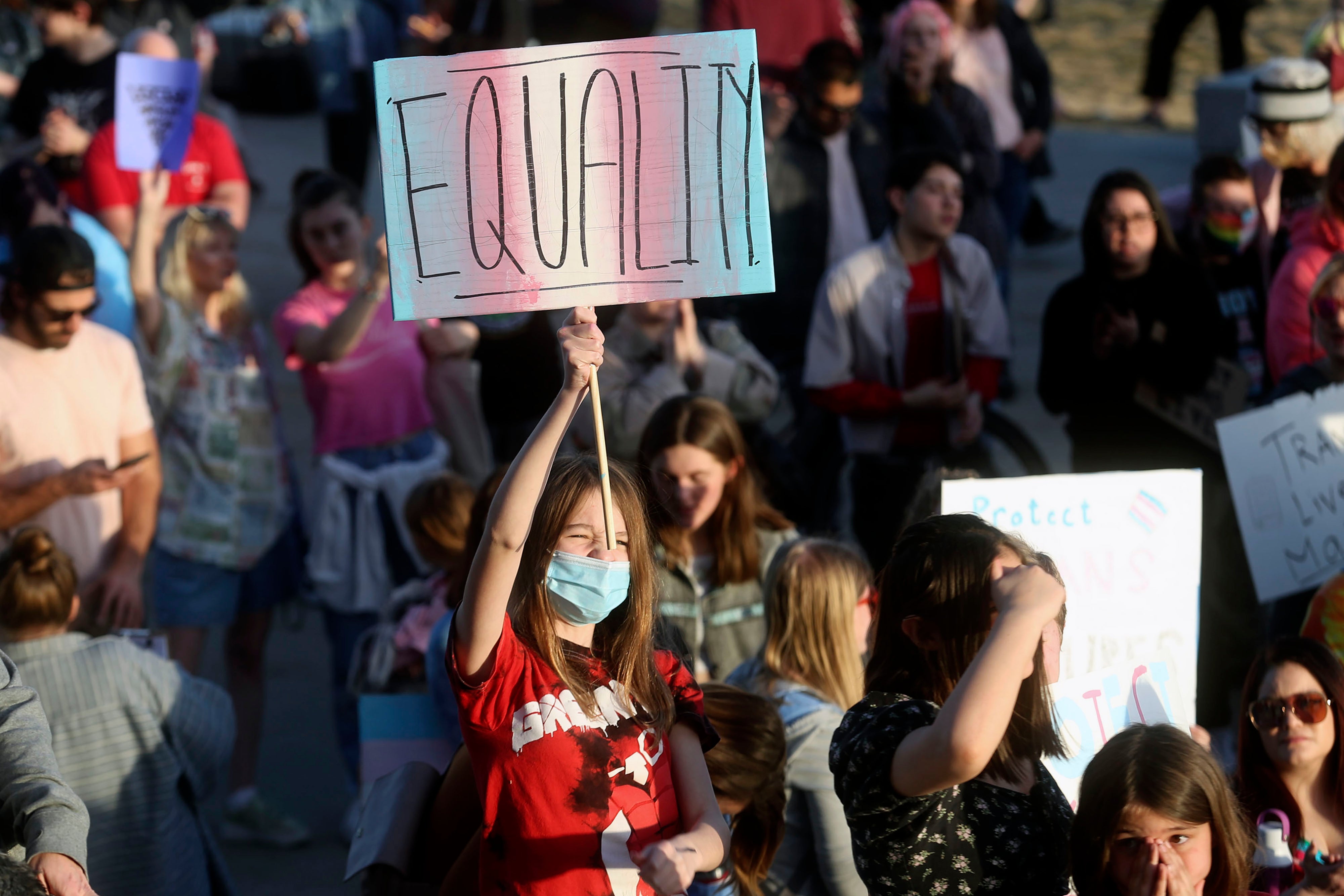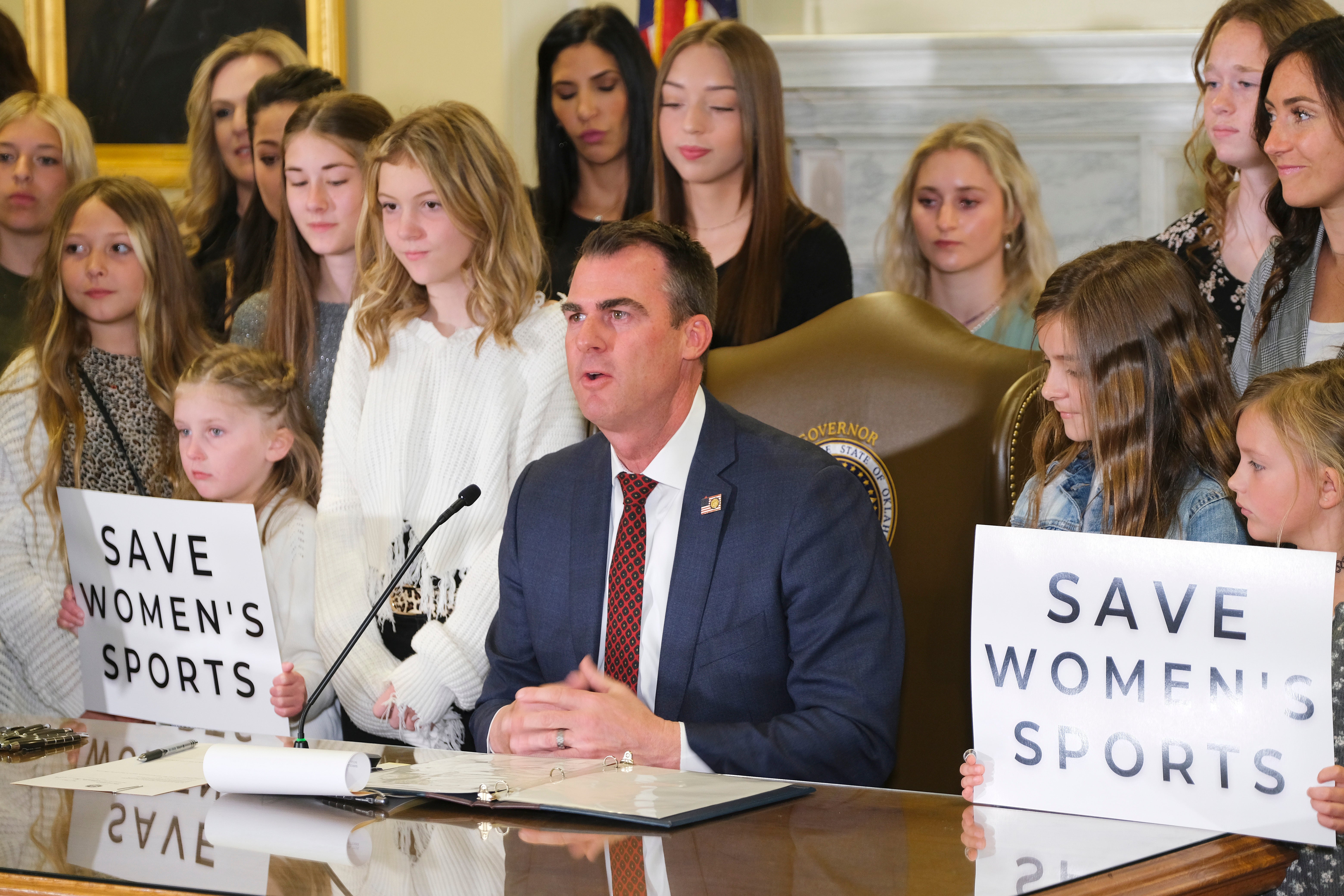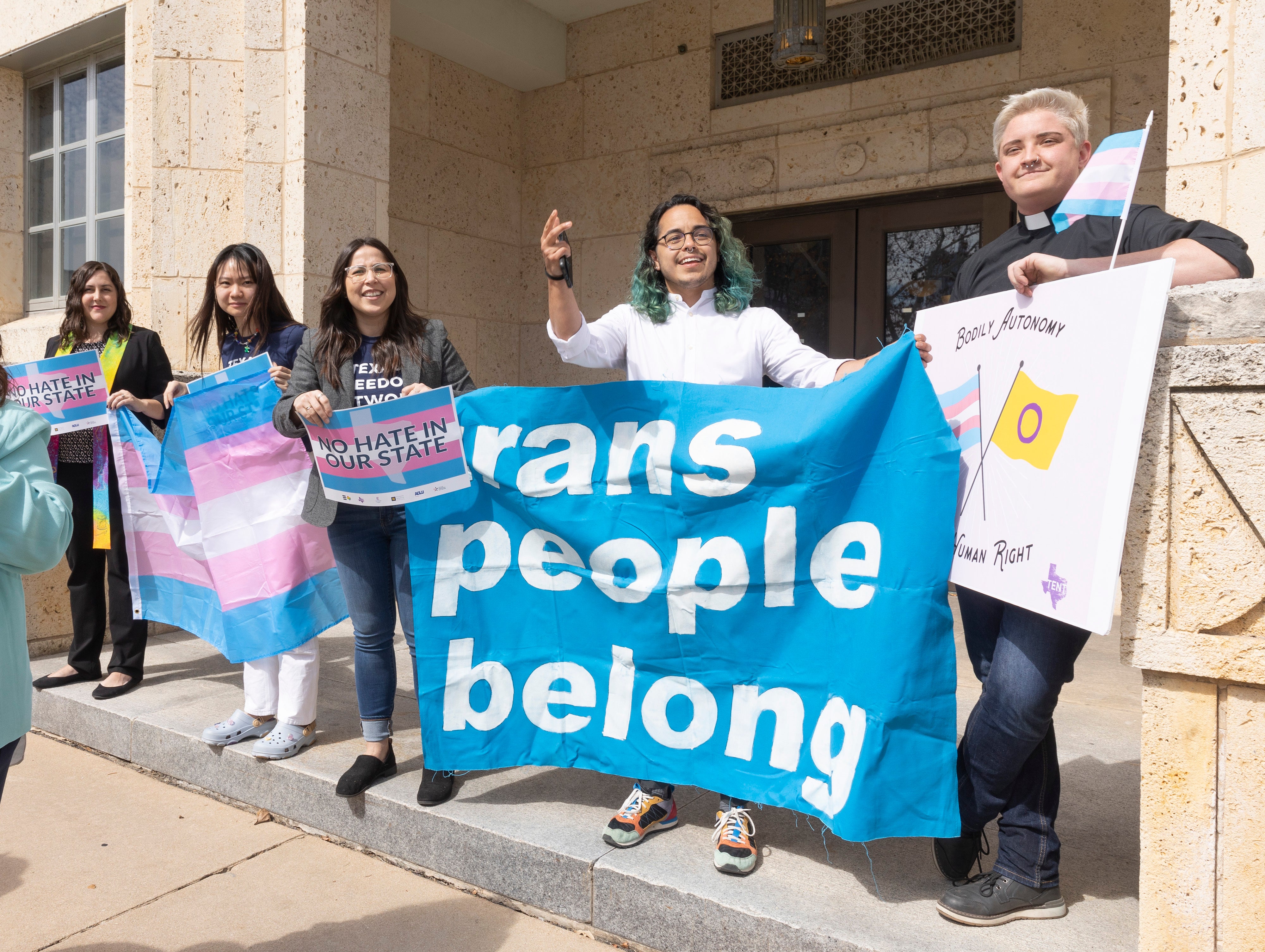‘No matter who it hurts’: How an explosion of GOP bills targeting LGBT+ Americans created a crisis
Conservative Christian groups and ‘parental rights’ agendas target young transgender people with an unprecedented wave of legislation that has nearly doubled within two years, Alex Woodward reports


More legislation targeting LGBT+ Americans was introduced within just the first few months of 2022 than in any other year. A majority of those state-level measures have sought to criminalise transgender healthcare and ban transgender children from participating in youth sports.
The legislative push – fuelled by influential conservative Christian groups and a “parental rights” agenda at the forefront of Republicans’ 2022 aspirations – has proven so pervasive within state legislatures this year that advocacy organisations tracking the bills have estimated as many as 600 measures affecting LGBT+ people may have been introduced.
The American Civil Liberties Union and Freedom For All Americans, relying on a more conservative estimate, are tracking more than 230 bills, while the Human Rights Campaign found more than 300 pieces of legislation considered harmful, with more than 130 of those measures targeting transgender people.
At least 29 bills would prohibit gender-affirming medical care for transgender young people, or criminalise such healthcare by charging parents and health providers with child abuse for approving it. At least 15 so-called “bathroom bills” – echoing transphobic campaigns from the previous decade – would ban transgender students and school staff from using bathrooms consistent with their gender. More than 50 bills seek to ban transgender athletes from school sports.
Legislation aims to “take away transgender youth support from their doctors, from their parents, from their teachers, from their coaches, from their teammates, from books, from curriculum entirely,” according to the Human Rights Campaign’s senior counsel Cathryn Oakley. “Each of these pieces takes another piece of that support away.”
This year’s unprecedented legislative action against transgender people already outpaces the number of measures filed in 2021, and has nearly doubled within just two years. Legislation targeting transgender people has surged from 18 bills in 2018 to more than 150 in 2022.
In 2021, nine states banned transgender athletes from participating in sports that match their gender.
This year, at least four similar bans were signed into law or passed through state legislatures in Arizona, Kentucky, Oklahoma and Utah in March alone.
Utah Governor Spencer Cox vetoed his state’s bill, pointing out that only four transgender students participate in high school sports in the state, and only one transgender student participates in women’s sports. State legislators moved to override his veto anyway.
Kentucky state Senator Karen Berg, the parent of a transgender child, said legislators are weaponising transgender children “as a political ploy to get votes no matter who it hurts.”
“Trying to navigate the world of middle school and high school, it takes a village to raise a child,” she said. “What they’re doing is trying to destroy that village.”
Behind the bills
Roughly 75 proposals would restrict or censor classroom speech, school curriculum and library materials, while allowing parents or people unaffiliated with the school to sue districts for perceived violations of the legislative text, which often relies on broad or vague language that makes it unclear whether a student can even mention their LGBT+ family members, in some cases.
That ambiguity has made tracking legislation difficult, as legislators have avoided using “transgender” or variations of LGBT+ related words within bill text, largely to escape scrutiny or to avoid acknowledging that their own legislation recognises the existence of transgender people, even if the authors do not, opponents have argued.
State-level legislation affecting LGBT+ people is also nearly identical. A network of powerful Christian conservative lobbyists and legal groups, evolving from a “religious freedom” movement in the 1990s, have helped draft and promote a wave of copycat bills across states while providing a well-financed body of legal defense.
Promise to America’s Children – a coalition with the Heritage Foundation, Alliance for Defending Freedom and Family Policy Alliance – offers legislators sample bills on its website.
“This is a very concerted effort by opponents of LGBTQ equality, from major national groups, who have been working with legislators across the country, to introduce legislation that discriminates against LGBTQ … particularly transgender children,” said Ms Oakley with the Human Rights Campaign.
“Trying to erase the entirety of the LGBTQ community from curriculum, from history books, from basic identities from being expressed in the classroom – there is a sense that if LGBTQ youth don’t know the words for their identities … that will prevent them from becoming LGBTQ,” she added.

As anti-LGBT+ legislation surged across the US, a loose network of fundamentalist Christian groups and conservative lobbyists identified as anti-LGBT+ “hate groups” by the Southern Poverty Law Center collected $110m in contributions during the financial year ending in 2020 alone, according to an analysis from NBC News.
The Alliance Defending Freedom – which reported $78m in assets in 2020, according to government filings – has a long track record of supporting efforts to undermine LGBT+ rights and marginalise LGBT+ Americans.
In 2003, the group filed an amicus brief in the landmark Lawrence v Texas case at the US Supreme Court to argue that consensual sex between LGBT+ adults is unconstitutional.
“The issue under rational-basis review is not whether Texas should be concerned about opposite-sex sodomy, but whether it is reasonable to believe that same-sex sodomy is a distinct public health problem,” the group argued. “It clearly is.”
The group also intervened in federal civil rights cases to exclude LGBT+ people from anti-discrimination laws, while its leadership has repeatedly condemned what it calls the “homosexual agenda” and compared LGBT+ people to paedophiles.
The organisation also helped craft so-called “bathroom” bills that reject transgender-inclusive school bathroom policies, including sending out copies of the group’s proposals to every school district in the US.
The Alliance Defending Freedom also helped draft restrictive abortion legislation at the centre of a Supreme Court challenge that could upend decades-long precedent established by the landmark ruling in Roe v Wade.
In 2020, the group helped draft a Republican-backed bill to ban transgender athletes from women’s sports as well as absorb “any legal defense fees” stemming from legal challenges against it. The measure was signed into law in March 2020, the first such successful ban in the US.
Following Oklahoma’s passage of a law banning transgender athletes from women’s sports on 30 March, the group’s senior counsel Emilie Kao said “comparably fit and trained males will always have physical advantages over females – that’s the reason we have girls’ sports.”
“Oklahoma now joins a strong coalition of states that recognize that reality and have acted to preserve fair competition for all females, whether in grade school or college,” Ms Kao added.
Florida’s “Parental Rights in Education Act” – which was signed into law by Governor Ron DeSantis on 28 March – stemmed from a 2021 lawsuit filed by a Florida couple whose then-13-year-old child said they “might be non-binary.” The family sued the school district, alleging that the child’s school helped their transition, which the parents rejected.
The couple, Jeffrey and January Littlejohn, are represented by attorneys with the Child & Parental Rights Campaign, a Georgia-based organisation that “defends parents’ right to secure their children against the social contagion and harms caused by gender identity ideology.”
GOP legislators in Florida who advanced the bill have contended that it was not driven by outside groups, though the Child & Parental Rights Campaign told Politico that it gave legislators suggestions to “tighten” its language.
Florida’s “Parental Rights in Education” law prohibits classroom instruction “on sexual orientation or gender identity” in kindergarten through third grade or “in a manner that is not age appropriate or developmentally appropriate for students in accordance with state standards” in other grades.
Following passage of the Florida bill, similarly worded legislation was filed in state legislatures in Georgia and Louisiana.
Florida’s law does not define “instruction” or age appropriateness, potentially leaving its interpretation open to bans on discussing LGBT+ people, history and events in curriculum, or students’ families, or questions from students about any of those issues.
Florida state Senator Shevrin Jones, the state senate’s first openly LGBT+ member and a former educator, said the governor’s “blatantly hostile legislation” is “doing the opposite of what we should be doing, which is bringing people together.”
“Conversations about gender identity and orientation are not taboo topics,” he said. “Classrooms should be places of inclusion, where every Florida child can learn safely and ask questions, but not in Ron DeSantis’s Florida.”
Misinformation and ‘textbook bullying’
The bills have rapidly advanced in state legislatures within the past few years against overwhelming public opposition.
Nearly eight in 10 Americans support laws to protect LGBT+ people from discrimination in jobs, housing and public accommodations, according to a Public Religion Research Institute survey released this month.
In 27 states, there are no explicit statewide measures to protect all people from discrimination on the basis of sexual orientation or gender identity in employment, housing and public accommodations, according to Freedom for All Americans.
The survey also found that 68 per cent of Americans support marriage equality, marking a rise in support from just 54 per cent in 2014.
Another March poll, conducted by Ipsos in partnership with ABC News, found that 62 per cent of Americans oppose so-called “Don’t Say Gay” legislation, while 37 per cent support it.
Hundreds of medical organisations, health providers and child welfare groups have also urged legislators to reject legislation aimed at transgender Americans. The American Medical Association, the American Academy of Pediatrics and other leading medical groups have endorsed gender-affirming care.
Growing pressure from dozens of major corporations also has largely been ignored or outright dismissed by Republican officials.
Most US adults are also unfamiliar with issues impacting transgender and nonbinary people, and the media most Americans read and watch largely does not mention them, according to a report from the Human Rights Campaign Foundation.
While visibility for transgender and non-binary people has increased in politics and political rhetoric, so has misinformation amplified by right-wing media, the report found.
“The data shows that the media must be more inclusive of members of the transgender and non-binary people to assist in the development of positive and open-minded opinions for audiences everywhere, especially the large number of people who know nothing about trans people and their lives,” the Human Rights Campaign’s Jay Brown said in a statement.

At the same time, caustic right-wing media figures and GOP officials across social media have embraced homophobic and transphobic remarks – from linking opponents of so-called “Don’t Say Gay” bills to paedophilia to attacking same-sex couples with children – while couching anti-LGBT+ legislation in “parental rights” and accusing opponents of wielding LGBT+ identities to create a false media narrative.
Critics have linked the rise in anti-LGBT+ legislation to a conservative backlash to progressive policy changes and cultural shifts, driven by a “fear that their belief system is a part of the past,” said Kansas state Rep Stephanie Byers, who is transgender.
“When you have an imbalance of power, an aggressive act, and repeated action, that’s textbook bullying no matter how you look at it. And for what reason? To get votes?” she said. “They do not need to garner these votes on the backs of trans people.”

Political rhetoric and emotional media coverage has also opened the floodgates for medical misinformation surrounding gender-affirming care for young transgender people, advocates argue, as care providers warn legislation will “compromise the safety and well-being of the young people we all have the duty and obligation to support and protect.”
A 2021 report from LGBT+ suicide prevention and crisis intervention group The Trevor Project found that LGBT+ youth are four times more likely to seriously consider, plan or attempt suicide than their peers, while LGBT+ young people between the ages of 13 and 24 attempt to kill themselves every 45 seconds within the US.
“Anytime a policymaker spreads the lies and misinformation about trans people and our medical care, it’s dangerous,” according to Chase Strangio, deputy director for transgender justice at the ACLU LGBT & HIV Project. “It tells trans people that our existence isn’t real, that we should be ashamed, and that we should be fearful. It also tells our families and communities to reject us and report us to the state – only escalating the interpersonal violence that too many trans people face.”
In Texas, Governor Greg Abbott’s administration has called for the state’s child protection agencies to prosecute families for child abuse for seeking gender-affirming care for their transgender children.
“They have just gone too far,” said Texas state Rep Jessica Gonzalez. “They are targeting innocent happy children in loving homes … They’re scared. Our families are scared. Our kids are scared. They want to take these children away from their parents simply for loving their child.”
A measure in Alabama – advanced by the Eagle Forum of Alabama, a wing of Eagle Forum, founded by Equal Rights Amendment opponent Phyllis Schlafly in 1972 – describes transition-related healthcare as “experimental.”
The legislation would block medical professionals and parents from providing gender-affirming medical care for transgender people younger than 19. It would make such care a felony, with a prison sentence of up to 10 years and fine of up to $15,000.
Alabama state Rep Neil Rafferty said the measure, which has been introduced and reintroduced several times over the past few years, is “like a bad zombie movie, it keeps coming back up.”
The proposal amounts to “putting [legislators] in the doctor’s office and wagging our fingers at parents,” he said. “We’re talking about an unprecedented move … dictating what parents do with private family medical decisions they make with a team of medical providers.”
Similar legislation has advanced in at least 24 states. Arkansas and Tennessee approved similar measures last year. Arizona legislators passed a similar bill in March.
“For trans kids, if they don’t have an affirming home, and they can’t find affirmation in schools, and they’re stuck in that dark place, walking in the darkness alone … then seeing their state is telling them that public school, which should be open and accepting to everyone around them, is also forbidding them to be themselves … then we wonder why suicide rates increase,” said Rep Byers, the Kansas legislator.
“Trans kids – they’ve got voices now,” she said. “They’ve got us.”
Join our commenting forum
Join thought-provoking conversations, follow other Independent readers and see their replies
Comments





Bookmark popover
Removed from bookmarks